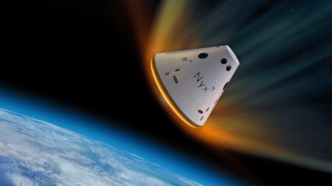At first glance, spacetech appears to be holding its ground. Global startup funding in the sector has consistently stayed above the $6 billion mark for the past two years, and 2025 seems to be following that same path. Startups across defense, satellite systems, launch vehicles, and geospatial analytics are still attracting healthy venture interest.
Yet beneath these stable numbers, investor strategies are evolving fast.
Changing Priorities Amid Global Tensions
While total capital hasn’t dipped, the reasoning behind investments is shifting, influenced by a mix of geopolitics, AI, and market uncertainty. According to a new report by Space Capital, geopolitical friction is increasingly shaping investor sentiment—especially when it comes to defense tech.
With growing concerns over China’s missile programs and space capabilities, Western investors are focusing more on startups tied to national security. Europe, reacting to changing dynamics with the U.S., has proposed its ReArm Europe plan, earmarking as much as $870 billion for defense initiatives. These shifts are pushing more funding into space-based technologies that align with national and regional security goals.
Investor sentiment toward SpaceX is also evolving. The company once dominated the space sector, but new competitors are now challenging its launch monopoly. Meanwhile, its Starlink business has come under political pressure due to controversies linked to Elon Musk, leading some investors to reevaluate their positions.
Where Spacetech Money Went in Q1 2025
Despite changes in sentiment, deal activity in spacetech remained robust in the first quarter of 2025. At least four companies raised rounds of $100 million or more, signaling continued confidence in the sector.
The biggest round went to Stoke Space, a reusable rocket company based in Kent, Washington. The startup closed a $260 million Series C in January, bringing its total funding to $436 million since its launch six years ago.
Another major deal came from Loft Orbital, which leases satellite space for commercial use. The San Francisco-based company raised $170 million in a Series C led by Axial Partners and Tikehau Capital.
K2 Space, a satellite manufacturer in Torrance, California, pulled in $110 million during its Series B in February as it ramps up production capabilities.
While the total funding volume placed Q1 in the middle of the last five quarters, the number of deals dipped slightly. Still, overall investor interest remained resilient.
AI Is Taking Off in Spacetech
One of the most exciting trends shaping spacetech in 2025 is the fusion of artificial intelligence and spatial technology. According to Space Capital, the intersection of geospatial AI and immersive AR is quickly becoming a hotbed for new startups.
Take Niantic, for example. After selling its gaming arm to Scopely, the company shifted focus entirely to spatial intelligence. Its new Niantic Spatial platform signals the growing importance of AR-driven geospatial insights. The firm is now repositioning itself as a geospatial AI startup under the leadership of founder John Hanke.
Another timely use case emerged through Muon Space. In collaboration with the Earth Fire Alliance, the company is deploying FireSat, a satellite constellation designed to detect and monitor global wildfires using AI. The first satellite launched successfully this March.
Meanwhile, Planet Labs, a prominent earth imaging provider, deepened its AI capabilities through a new partnership with Anthropic. The collaboration leverages Claude, Anthropic’s large language model, to enhance satellite data analysis.
Market Volatility Weighs on Public Players
Despite private market momentum, public market conditions have added a layer of uncertainty. Although recent tariff reductions offered a temporary boost, stocks for major spacetech companies have slipped in recent weeks.
Even giants like Lockheed Martin and other U.S. defense contractors have seen their share prices dip. The sector’s broader volatility reflects investor caution amid global economic shifts.
Still, venture investors are sticking to their long-term playbooks. While IPOs and exits may be on pause, well-funded startups with innovative models—especially those blending AI, defense, and spatial analytics—are in a strong position to weather the storm and emerge stronger on the other side.











